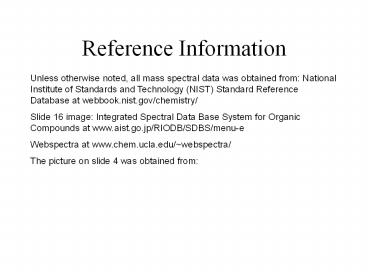Reference Information - PowerPoint PPT Presentation
Title:
Reference Information
Description:
Analytical Chemistry Mass Spectrometry EI-MS of 2,2-Dimethyl Pentane EI-MS of 2,2 ... Mass Spectrometry Infrared (IR) Spectroscopy Nuclear ... – PowerPoint PPT presentation
Number of Views:109
Avg rating:3.0/5.0
Title: Reference Information
1
Reference Information
Unless otherwise noted, all mass spectral data
was obtained from National Institute of
Standards and Technology (NIST) Standard
Reference Database at webbook.nist.gov/chemistry/
Slide 16 image Integrated Spectral Data Base
System for Organic Compounds at
www.aist.go.jp/RIODB/SDBS/menu-e Webspectra at
www.chem.ucla.edu/webspectra/ The picture on
slide 4 was obtained from
2
Analytical Chemistry
Chromatography (Separations) Mass
Spectrometry Infrared (IR) Spectroscopy
Nuclear Magnetic Resonance (NMR) Spectroscopy
X-ray Crystallography (visual solid state
molecular structure)
3
Mass Spectrometry
What insights are we hoping to gain?
Molecular Mass/Isotopic Distribution
Molecular Formula Some Structural
Characteristics Fragmentation Pattern
4
Only molecules of the correct m/z (mass/charge)
will make it to the detector.
5
EI-MS of 2,2-Dimethyl Pentane
6
EI-MS of 2,2-Dimethyl Pentane
Peaks with smaller m/z values __ called fragment
ion peaks __ represent positively charged
fragments of the parent molecule
7
EI-MS of 2,2-Dimethyl Pentane
8
EI-MS of n-Propanol
9
EI-MS of 4-Heptanone
10
EI-MS of 4-Heptanone
11
EI-MS of 4-Heptanone
12
Isotopes
13
EI-MS of Benzyl Bromide
14
Isotopes
15
EI-MS of Benzyl Bromide
16
EI-MS of 4-Chloroanisole
17
Isotopes
18
Isotopes
19
What about Identical Masses?
20
Exact Mass































